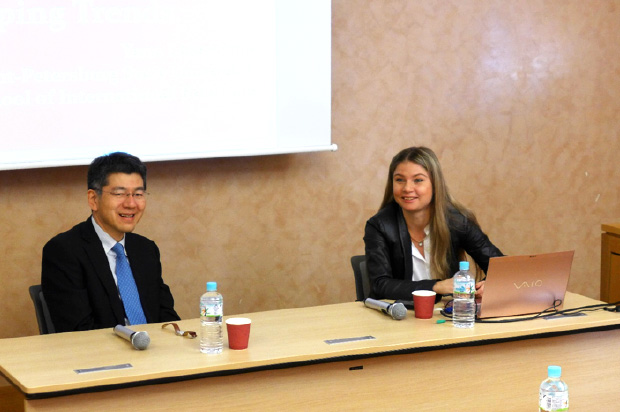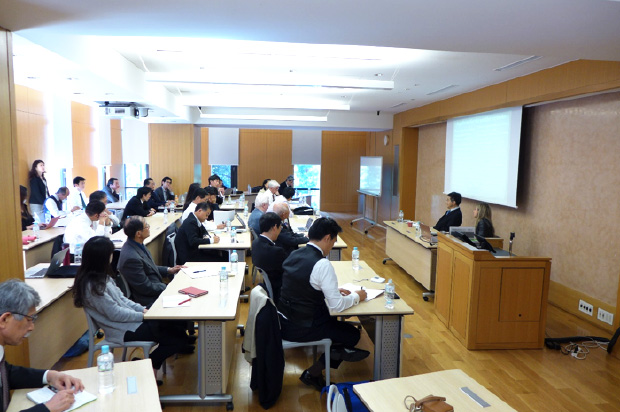SSU Forum with Professor Yana Leksyutina
| Date: | Monday, October 26 2015, 10:30-12:00 |
|---|---|
| Venue: | Seminar Room, 3rd Floor, Ito International Research Center |
| Subject: | Russia-China relations in the 21st century: major characteristics and developing trends |
| Lecture: | Yana Leksyutina, Associate Professor of the Saint-Petersburg State University, School of International Relations |
| Language: | English |
| Hosted by: | Security Studies Unit, Policy Alternatives Research Institute, the University of Tokyo |
| Co-hosted by: | The Economy-Security Nexus |
The Security Studies Unit was honoured to host Professor Yana Leksyutina, from the School of International Relations, Saint Petersburg State University (Russia), who delivered a talked entitled “Russia-China Relations in the 21st century: Major Characteristics and Developing Trends”.
Professor Akio Takahara introduced the speaker as an outstanding expert on the topic and price winner in Russia, who has been acting as visiting scholar at the Graduate School of Law and Politics of the University of Tokyo. Professor Takahara highlighted the rarity of visitors from Russia, and expressed the hope that the situation will change in the future, with the progressive strengthening of ties between academic institutions.

Professor Leksyutina expressed her gratitude to Professor Takahara for arranging not only this forum, but the chance itself of being hosted at the UTokyo as a visiting scholar. She also thanked the Ito International Research Center for the hospitality, proceeding then to the matter of her presentation.
She underscored how the question of Russia-China relation is seldom taken into consideration in a systematic fashion when Asian affairs are discussed, although the topic is growing in importance. There are a number of very different views on the subject, and the Russian perspective may be quite distant from other dominant narratives, particularly those formulated in Western countries. She immediately stated that, albeit there are clearly risks and elements of uncertainty about Russia-China relations, her main take on the matter is a positive one. Looking at it from an historical perspective, it is possible to affirm that bilateral relations between the two powers are at a historical high, as never before in the past decades Moscow and Beijing have shown such a degree of mutual coordination and understanding. To prove this point, Professor Leksyutina provided to the audience an historical reconstruction of the Soviet/Russian relations with China from 1949 to the present. After the proclamation of the People’s Republic of China, the country entered in a period of very deep cooperation and successively military alliance with the USSR, which provided a colossal amount of economic assistance and technology transfer. In that relation, based on the ideological platform of Marxism-Leninism, the USSR was clearly hegemonic. However, by the late 1950s the relations started to deteriorate, partially due to doctrinal divergences, partially because of reciprocal mistrust among the top leaderships. The situation deteriorated to the point of borderland military conflict over territorial disputed in the 1960s and 1970s. Overall, it remained at a very low point until the late 1980s, when a change of course in international politics was initiated under Mikhail Gorbachev (so called perestroika). Because of the disintegration of the USSR and the successive socio-economic turmoil, reconstruction of Russia-China relations proceeded very slowly, albeit steadily, fostered by the common wish to normalise external relations.
Moving forward to the contemporary era, Professor Leksyutina illustrated how the years after 2000 saw a rebirth of bilateral relations on a very large scale, particularly after the 2001 Sino-Russian Treaty of Friendship was signed, which led to the currently very positive state of affairs. To back her claim, she offered an analysis of the wording used by both sides in official documents, which shows a rapid transition in a few years from “good neighbourhood” to “strategic partnership” and to (2014) a “new stage of comprehensive partnership and strategic cooperation”.
Professor Leksyutina successively offered some insights in the current situation. Today, no common ideology exists between Moscow and Beijing, but there is a convergence of interests, in pragmatic terms. This will not lead, with all probability, to the creation of a formal alliance, but to enhanced forms of cooperation.

She also took in consideration a number of elements which, as underscored by many analysts in the Western world and some in Russia itself, may induce a less positive outlook. They may see China becoming increasingly assertive towards the sparsely populated regions of the Russian Far East, and more in general, hegemonic vis-à-vis Russia, not to mention the possible geopolitical competition in the former Soviet Central Asia. These issues have been in Professor Leksyutina’s view overly emphasised. As China is clearly interested in expanding to the South and to the East, a northwards thrust has not materialised, nor any massive Chinese immigration to Russia. Russia and China have in the meantime settled all territorial disputes, which has led a vast reduction of military presence in the region. With the signing of over a hundred protocols to regulate trade, travel, energy and numerous other topics, relations have evolved very rapidly and positively. Of particular importance are here both the SCO (Shanghai Cooperation Organisation), and the BRICS. The SCO has functioned as a forum for the settlement of problem in Central Asia, while the BRICS (a global forum formed by Brazil, Russia, India, China and South Africa) provides a platform for the discussion and development of a multipolar world. This latter point is particularly important: both Russia and China converge on the idea that the world should not be dominated by the US as the “only superpower”, but it should be instead governed by a concert of great powers, which act in respect of international law, and the principles of non-intervention, non-interference in the internal affairs of other states, save through measured authorised by the UN Security Council (UNSC). Because of this shared views, China and Russia also converge on their respective view of current regional crises, particularly on Libya and Syria. Professor Leksyutina has shown how the two countries display similar voting patterns in the UNSC and the exercise of their veto power.
Beijing and Moscow are also working very closely in order to promote the idea that a series of reforms in the global economic and monetary governance system are needed, in particular as the current arrangement is perceived to be unfairly favourable to the US and Western Europe. Attempts at constructing an alternative financial infrastructure, and the possible, future internationalisation of the Chinese Renminbi should be read in this context.
Finally, Professor Leksyutina illustrated the Russian move towards a closer cooperation with China, and in general a more pronounced eastward orientation, in the aftermath of the Ukrainian crisis. This has been so far articulated in the expansion of pipeline networks supplying China and possibly other Asian nations, closer military cooperation including frequent joint military exercises, and lastly a large scale effort to develop the Russian Far East as a window towards the Pacific region.

-
Associate Professor of the Saint-Petersburg State University, School of International Relations
